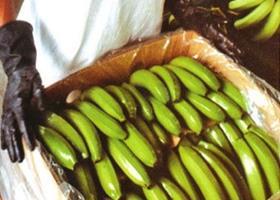
In December, the Fairtrade Foundation welcomed the progress made by the government of the Dominican Republic in legally recognising thousands of Haitian migrants employed on the country’s banana plantations. Here, Bridget Wooding of the Caribbean Migrants Observatory (OBMICA) has her say on the situation.
Fairtrade is right to welcome the progress made by the Dominican Republic Government in giving legal status to thousands of banana workers in the context of a nationwide regularisation programme for longstanding migrants with irregular status in that country. The Dominican Republic has been the last nation in the Americas to engage in such a programme while hosting a significant number of irregular migrants, hence the programme is overdue. Indeed is should have taken place a decade ago as part of the transition procedures preceding implementation of the new General Migration Law of 2004.
Official figures from the National Statistics Office, in the first national survey of all immigrants in 2012 in the Dominican Republic, put the Haitian collective at some 458,233 persons, the vast majority of whom lacked a positive migration status, among them many Haitian banana workers.
The latest figure in December 2015 of 239,956 persons documented through the National Plan is a step forward, although 17 per cent of those registered did not obtain a regular status. Crucially, a very small percentage of those who registered and were regularised completed documentation and were granted a residency permit. This had been the net aim of the programme. One advantage of the latter status is that legal residence is a pre-requisite for foreigners being able to register their children born in the Dominican Republic as Dominicans. These realities suggest that the bar was set too high for the category of migrant in question and the timeframe was too short for applicants to complete the requisite documents, including Haitian identity documents where relevant.
For those who did not obtain a residency document, the temporary stay (one or two years) will soon come up for renewal, given that the starting date for documentation is the date that files were first deposited and not when the documentation was approved. Uncertainties abound as to how that process squares with the national migration law, which many believe requires urgent reform. Importantly, an overwhelming majority of regular migrants do not have automatic access to certain services nor to significant labour rights, including social security. Supplementary dispositions are being put into place and will need to be stepped up for these workers to obtain benefits from their legal status, beyond being ‘non-deportable’ to neighbouring Haiti.
With European Union support, mobile units enabled banana workers to register for the Plan but the phase of picking up approved documentation has been less amenable for workers to know what is happening and with imprecise cut-off dates for when this may be done. This leads to unease and anxiety on the part of the Haitian workers and their representative organisations as to final intentions on the part of the authorities and the workers’ employers.
Those enjoying Fairtrade bananas in Europe should know that important strides have been made in the Dominican Republic but it is far from clear that the programme begun will be sustainable. The time is ripe in 2016 to build on important but insufficient gains made in 2015.



